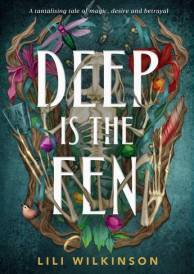Lupita Nyong'o Queen of Katwe
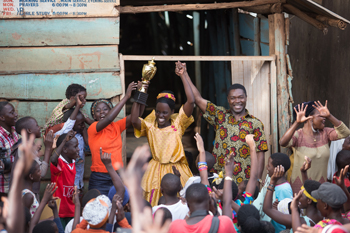
Lupita Nyong'o Queen of Katwe
Cast: Lupita Nyong'o, David Oyelowo, Ntare Guma Mbaho Mwine
Director: Mira Nair
Genre: Biography, Drama, Sport
Rated: PG
Running Time: 124 minutes
Synopsis: Life in Uganda for 9-year-old Phiona Mutesi (Madina Nalwanga) is a constant struggle. She spends her days selling vegetables on the streets of Katwe, one of the most poverty-stricken slums in Kampala, so school is not an option. Her mother, Harriet (Lupita Nyong'o), a proud and strong-willed woman, works hard to support her family, and while she loves and protects her children with a fierce compassion she is consumed by the daily grind and worries that she can never offer them the promise of a better life.
Robert Katende (David Oyelowo) offers that promise. Katende runs a chess program for Katwe children from a makeshift Agape Church utilising the game as a platform to engage and sharpen their minds. Chess cultivates abstract thinking, innovation and creativity, skills that will prepare them for a formal education and a better life. When Phiona follows her brother Brian (Martin Kabanza) to the church one day, she observes Katende sharing the fundamentals of chess with children her own age. It is a moment that will seal her destiny.
She is mesmerised by the game and quickly catches on to its meticulous rules and the importance each calculated move on the board holds. Katende feels an immediate bond with Phiona and recognizing her extraordinary aptitude begins to mentor her. Harriet, however, does not understand why a game is more important than feeding her family. She views dreaming as the very thing that can hinder survival and not wanting to see Phiona disappointed, forbids her to return.
Katende knows what it takes to survive, but he also knows what it is to aspire. With help from Brian, he manages to persuade Harriet to put her fears aside and support her daughter's dream of playing chess competitively. Phiona rapidly advances through the ranks of chess tournaments, and within two years becomes Uganda's junior champion with her sights set on the national championship, despite being illiterate. She struggles with the contradiction between success and her precarious life on the streets. There is no questioning her ability. The only question now is, can she find a way to live and be content in both worlds?
Queen of Katwe
Release Date: September 30th, 2016
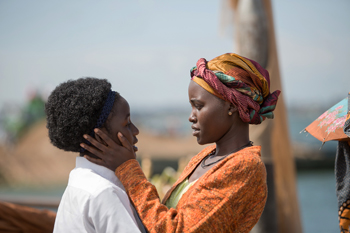 About The Production
About The Production
It was an article by Tim Crothers in ESPN Magazine where John Carls ('Rango," 'Where the Wild Things Are") first learned about the work of Sports Outreach and realised its cinematic potential. The producer was especially interested in the work of Robert Katende.
A soccer coach for Sports Outreach, a faith-based organisation that uses sports to make a difference in the lives of at-risk youth in the poorest areas of the world, Katende was a civil engineer searching for a job that would financially support his wife and two children when his faith, compassion and love of soccer led him to Katwe. This led to the development of his chess program, which over the next few years helped shape the lives of countless children, Phiona Mutesi being one of them. The fact that it was a true story seemed almost as implausible as the story itself.
'Before I met Robert and started playing chess, I had lost all hope," says Phiona Mutesi. 'I was sad because I recently lost my dad and there was no money for school and I thought I would always be living on the streets. Since then, I have travelled to many different countries and met many wonderful people who I never expected to meet, which has helped restore my hope. I thank God that I met Robert and learned to play chess, because it is chess that made all these things possible."
Phiona Mutesi's incredible journey from the streets of Uganda to a world-class chess player embodies the strength of the human spirit, and Disney, a studio with a successful track record for bringing fact-based stories to the big screen, was soon on board. Up first, was the search for a director – someone with a strong visual aesthetic who was just as passionate about the story.
Tendo Nagenda, an executive vice president of production at the studio, immediately thought of Mira Nair. A director best known for her lush and vibrant films spanning a variety of cultures, Mira Nair's credits include the Oscar®-nominated 'Salaam Bombay!," which also won the Camera D'Or at the 1988 Cannes Film Festival; 'Mississippi Masala"; 'Monsoon Wedding," for which she won the Golden Lion at the 2001 Venice Film Festival; and 'The Namesake."
Mira Nair has had a home in Kampala for the past 27 years and is the founder of Maisha Film Lab, a film school for East Africans. In Kampala to attend a family reunion, Nagenda, whose father is Ugandan, pitched Phiona's story to Mira Nair. The director was immediately riveted, and could hardly believe this extraordinary young girl lived just minutes away from her home, yet she had never heard her name before.
'It was quite ironic," Mira Nair remembers, 'As one of my mantras is that if we don't tell our stories, no one else will, yet here was a story that was so local yet came from Hollywood."
Producer Lydia Dean Pilcher has worked with Mira Nair on more than 10 films and she, too, fell in love with the story. 'I love the female protagonist, the coming-of-age story and watching this young girl change and grow into this mature sophisticated teenager in the course of learning the game of chess," she says.
The director began forging relationships with the story's central characters to better familiarise herself with the timeline of events and recruited William Wheeler ('The Reluctant Fundamentalist") to write the screenplay. William Wheeler, who also happens to be a tremendous chess player, joined Mira Nair and Lydia Dean Pilcher in Kampala, where they spent time with Phiona, Harriet and Katende and many of the original students in his chess program, whom he affectionately refers to as his Pioneers.
'Robert Katende told me Phiona didn't believe in herself for a long time, but when I first met her I was struck by her maturity and poise," says Lydia Dean Pilcher. 'She had this lovely sense of self-possession, and then I noticed that Stellah, another Pioneer, had the same quality, as did Gloria, and it has to be because they're all involved in the chess program. All of them are living on very basic levels of subsistence, yet they all feel so very powerful."
Because this was based on a true story, William Wheeler approached the screenplay with great care and respect. 'You can't create your own dramatic moments and story arcs," he explains. 'You have to find the critical moments when the characters make important decisions or have their greatest setbacks and build the flow of the screenplay around those."
It turned out to be an incredibly redemptive experience. 'This story taught me to encourage my kids to value what they can learn, who they can be and what they can do for others," William Wheeler continues. 'It taught me to appreciate the people and things in my life."
Casting The Players
Finding actors to play characters based on real people is not always easy, but director Mira Nair's first choice for the role of Robert Katende was an actor who had electrified audiences with his portrayal of a beloved historical figure two years earlier. The role was Martin Luther King Jr. in the film 'Selma," and the actor was David Oyelowo.
'David is a chameleon," Mira Nair says. 'He allows himself to disappear into whichever role he is playing so that you don't even recognise him. There's so much gravitas in him and yet some mischief too, and he looks uncannily like Robert Katende."
Classically trained and of Nigerian-British descent, David Oyelowo was eager to work with the acclaimed director. 'I've always admired her films," he says, '-Mississippi Masala' had a profound effect on me growing up."
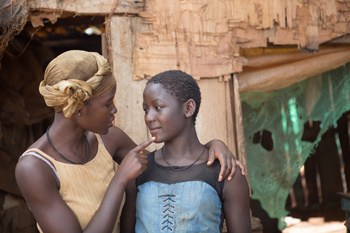 He was enthusiastic after reading the 'Queen of Katwe" screenplay, and was inspired by the passion and humility of the man who chooses to use his talents to give back to the community in which he resides. 'One thing that really surprised me was how heartwarming the story is and how these people manage to be so full of joy in spite of such very difficult lives," David Oyelowo says. 'And it's that joy that enables them to transcend their surroundings."
He was enthusiastic after reading the 'Queen of Katwe" screenplay, and was inspired by the passion and humility of the man who chooses to use his talents to give back to the community in which he resides. 'One thing that really surprised me was how heartwarming the story is and how these people manage to be so full of joy in spite of such very difficult lives," David Oyelowo says. 'And it's that joy that enables them to transcend their surroundings." In addition, he was thrilled to be a part of a film that would cast a positive light on a part of the world not always viewed with optimism. 'As a Nigerian, I'm frustrated by how little we see of the real face of Africa in Western movies, how we're always confronted with the dark side – dictators, genocide, disease – when I know this continent is filled with tremendous stories of hope, triumph, love and joy," he explains. 'This was one of those stories filmed in Africa, played by Africans and filmed by a woman who has lived on the continent for nearly 30 years, so I knew we were in good hands."
The actor was somewhat concerned as to the best way to portray someone with so much goodness and have it feel believable. 'I was both intrigued and terrified at the same time," explains David Oyelowo. 'There is something so radiant about Robert Katende's presence that I was hoping to convey…I just wanted to be sure I did him justice."
'Robert Katende is not a saint," cautions Mira Nair, 'But he is completely morally-centered and unbelievably generous. There is no sense of any contrivance in how he thinks and he always thinks beyond himself, and David Oyelowo completely alchemized that. David Oyelowo made the part his own with real humor and a deep emotionality that's extremely moving, shifting it away from some kind of do-gooder or missionary into something much more complex."
The role of Harriet was written for Lupita Nyong'o, whom Nair has known for years. 'I think of Harriet as a young Mother Courage, and that is the strength and beauty that is in Lupita Nyong'o," says Mira Nair. A child of East Africa, an alumnus of Maisha Film Lab and an intern at Mira Nair's production company Mirabai Films in New York, Lupita Nyong'o shot to fame with her Oscar®-winning performance in '12 Years a Slave," which she followed with roles in 'Star Wars: A Force Awakens" and 'The Jungle Book."
Lupita Nyong'o broke down and cried after reading just 10 pages of the script. 'It was the first time in a while that I had been so enlivened, inspired and challenged by a role I was considering," she remembers. 'I immediately sent an email to my representatives saying, -I must do this film.'"
'The story has a lot to do with the power of dreams," Lupita Nyong'o continues. 'Robert Katende believes that dreams are what can manifest a life well lived, while for Harriet, dreaming is dangerous because it fills you with expectations that life may not be able to meet. For her, it is a tug of war between love and fear: to love is to fear for those you love. But then she realises that it is her fear that is holding her child back and she has to learn to let go of it."
Having both been trained on the stage, Lydia Nyong'o and David Oyelowo share a similar strength and passion for their craft, and could often be found on set running lines between takes to perfect their characters' dialect and speech patterns. 'David Oyelowo is such a generous actor," Lupita Nyong'o says. 'I have full faith and trust that he will throw a ball to me that I will then have to catch and throw back. He's so present…you don't know what he's going to give you from take to take, and for an actor that is really exciting."
'Lupita Nyong'o lives each scene moment by moment," adds David Oyelowo. 'There are few actors who I can say that, when you're in a scene with them you bring everything you have because otherwise you'll be left behind, and she is one of those."
The role of Phiona Mutesi is a formidable one, as she appears in almost every scene of the film. The character undergoes a transformation from child on the streets to a champion chess player in under four years, and the actor cast would need to hold her own alongside such acting heavy weights as Lupita Nyong'o and David Oyelowo. The casting process took over a year, during which time the filmmakers looked at close to 700 girls from the UK, South Africa and East Africa, Kenya, Tanzania and Uganda. Ironically, the production found their Phiona just 15-minutes down the road in Kibuli, an area not far from Katwe, weeks before filming began.
Casting director Dinaz Stafford ('Mississippi Masala," 'The Perez Family") first spotted 14-year-old Madina Nalwanga in a dance rehearsal at the Sosolya Undugu Dance Academy and could not take her eyes off her. 'While slightly older than what we were originally looking for, she was simply electric," says Dinaz Stafford. 'I asked her to audition for the role and filmed her on my phone doing a simple scene, and felt that she had the confidence to take on the part."
It took another six weeks of intense workshops and training for Nair to be convinced that Madina indeed could carry the role of Phiona. 'We were working in Ugandan English and English is not the language that Madina Nalwanga thinks in. But ultimately she internalized the scenes to such an extent that language didn't matter," says Mira Nair. 'That was such a relief as I always wanted to film her. Her physicality is so arresting and her spirit so exquisite. And she is the real thing."
'The only way to describe her is luminous," continues Mira Nair. 'Madina Nalwanga has this light inside her that just shines, and from our first shot to our last, she was phenomenal. She's an extraordinary, poised young woman who met every challenge with grace, humility and humor."
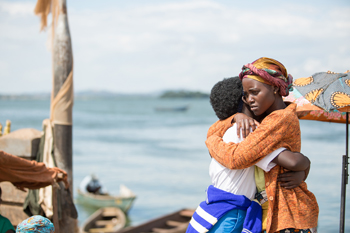 Like Phiona, Madina was selling corn on the streets with her brother when she was 4 years old before the owner of the dance academy, which offers shelter, education and dance and drama skills to socially disadvantaged and vulnerable youth, rescued her.
Like Phiona, Madina was selling corn on the streets with her brother when she was 4 years old before the owner of the dance academy, which offers shelter, education and dance and drama skills to socially disadvantaged and vulnerable youth, rescued her. 'Phiona's story is like my story," Madina Nalwanga says. 'Her background is like my background, but for her it was chess that changed everything and for me it was dancing and singing."
'I watched Madina Nalwanga do things that can't be taught – the truthfulness, the subtlety, the confidence," says David Oyelowo. 'I honestly don't know where she got it from. She lives not far from the Katwe slum where Phiona grew up and here she is, the lead in a gigantic studio movie and she is wearing it with such grace, such humility and with such ability. To be around her is pure joy for me."
Adds Lupita Nyong'o, 'Seeing Madina Nalwanga grow on a day-to-day basis and from scene to scene was spellbinding. She has an instinct for this thing called acting. Mira Nair never has to tell her anything twice. By the next take she will have deepened her understanding of the dynamic, what's happening in the moment and she'll give you something else."
'You have to be very well disciplined to be an actor," says Madina Nalwanga, 'And you need to be respectful to everyone. I made so many friends during filming and think of them now as my family. I will carry everyone's laugh in my heart and will never forget this experience."
Ugandan locals Taryn 'Kay" Kyaze and Martin Kabanza play Phiona's siblings, older sister Night and younger brother Brian, respectively. Brian, who was also a student of Katende's, now teaches chess in Kampala and studies electrical engineering. Nair first spotted the 14-year-old playing soccer down the road from her home in Buziga and was impressed with how he managed to hold his own and come across completely genuine without being overly cute.
'I had never acted before," says Martin Kabanza, 'But I learned a lot of things from the acting workshops like how to concentrate and stay in character. We also learned how to play chess and I got to ride on an airplane for the first time, too."
Night is the cautionary tale in the story. While strikingly beautiful, she struggles with the hand she has been dealt in life, and, like so many other young women her age, feels that the only way out of the slums is by catching the eye of an older, wealthier man. It is her story that helps fuel Phiona's determination to succeed at chess and escape on her own terms.
Taryn Kyaze was able to spend time with Night, which, on occasion, was almost overwhelming. 'She went through so much," Tayrn Kyaze says, 'And there were a number of times when I had to bite my lip to keep from crying. There is no money for school, yet these girls desperately want to find a way out. I do not look at Night as a rebel, but as more of a lost soul. She needs guidance. She thinks she knows about the real world, but she actually has no clue at all."
As the director has done with her past films, Mira Nair has the ability to nurture young talent and draw out poignant and authentic performances. 'Mira Nair is just wonderful with child actors," says producer John Carls. 'She has a genuine love for them, and they in turn, feel safe with her."
The Pioneers were the first group of chess players coached by Katende who played the game in the dirt with bottle caps. The filmmakers were looking to cast local children whose lives resembled the actual Pioneers – children who could carry the essence of a character yet still be confident enough to let a little of their personality shine through.
Within two weeks, they had found the children who would be part of the workshops that would bring the Pioneers together as an ensemble group reflecting the closeness of the originals. Included in the group were a mix of both middle class and slum kids.
The filmmakers realized the enormous responsibility involved when working with young children, especially when they come from under-privileged backgrounds, and provided tutors, workshops and training exercises to help provide them with transferable life skills they could take with them when production wrapped.
Nikita Waligwa was found through an open casting call and cast as Gloria, the youngest of Katende's chess players who teaches Phiona the basics of chess. Ethan Nazario Lubega plays Benjamin, the first boy to lose to Phiona. 'I fell in love with this little bullet of a boy," Mira Nair recalls. 'He was smart and sharp and could be a handful, but he was truly unforgettable."
About The Production
Principal photography on 'Queen of Katwe" took place from April to June of 2015 in and around Katwe and Kibuli in Kampala, Uganda, as well as in Johannesburg, South Africa, employing local crews and extras in both countries.
The creative team helping to bring the story to life includes director of photography Sean Bobbitt, B.S.C., ('12 Years a Slave," 'Hunger"); production designer Stephanie Carroll ('The Namesake," 'Monsoon Wedding"); Oscar®-nominated editor Barry Alexander Brown ('Salaam Bombay!" 'Inside Man," 'Malcolm X"); composer Alex Heffes ('The Last King of Scotland," 'State of Play"); and costume designer Mobolaji Dawodu ('Mother of George," 'Restless City").
Kampala, the capital of Uganda, is located on the eastern shores of Lake Victoria, Africa's largest lake, and with a population of just under two million people is one of the fastest growing cities in Africa. Katwe is located several miles south of Kampala's primary business district, and both it and its surrounding areas are the most densely populated areas in the city, yet for its inhabitants, downtown Kampala seems a world away.
The essence of life in Uganda is as vital to Mira Nair as the characters that inhabit it. In order to capture both the essence of Katwe and the intimacy of Phiona's family, the director wanted a cinematographer who was familiar with Africa but could also bring his own perspective to the screen. 'We needed someone who could dance with life as well as create an extraordinarily classical frame," Mira Nair says.
The director has always been impressed with the ferocity and passion of Sean Bobbitt's work, and hired the DP to shoot 'Queen of Katwe." Says Mira Nair, 'He has this amazing poetry with his hand-held work that takes us right into the heart of the scenes we're shooting."
'Katwe is the visual heart of the film," explains Sean Bobbitt. 'As a news and documentary cameraman, I've been faced with drab poverty in slums all over the world, but Katwe is different. There is vibrancy there, a density of color and a unique pallet. The contrast of the red earth with the yellows and blues they use to paint the buildings, the density of humanity, the bright elements of clothing, the constant movement. Everywhere we pointed the camera, there was something of beauty."
Sean Bobbitt shot the film with the widest lenses possible to create larger-than-life images, a task that proved to be somewhat challenging but produced the desired end result.
In the slums of Katwe and Kibuli, the boundaries between the film and the reality of life on the streets are constantly blurred. It is often unclear where the set begins and ends as it blends seamlessly with the surrounding streets, and it was always Mira Nair's intention to bring absolute authenticity to the film.
'I come from a tradition of cinéma vérité and documentary and I've always maintained that authenticity is my greatest treasure," she explains. 'We organically evolved the script from the characters and the people themselves and similarly these locations became interwoven with the whole concept of the film."
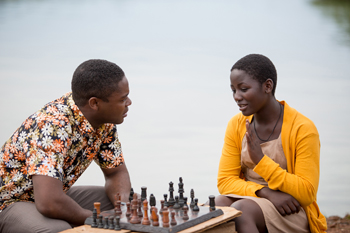 From tiny beauty salons and automotive repair shops to fresh fruit stands and fashion stores, Katwe has its own hub of commerce. It is a veritable beehive of activity and entrepreneurship – life is lived on the street, and it is colorful. 'This story gave me a chance to bring to screen what I love about living in Uganda," says Mira Nair. 'To visually capture the human dignity of our people, the vibrant, original style, the streets that pulsate with life. It is about time that we see an honest version of the place we live in."
From tiny beauty salons and automotive repair shops to fresh fruit stands and fashion stores, Katwe has its own hub of commerce. It is a veritable beehive of activity and entrepreneurship – life is lived on the street, and it is colorful. 'This story gave me a chance to bring to screen what I love about living in Uganda," says Mira Nair. 'To visually capture the human dignity of our people, the vibrant, original style, the streets that pulsate with life. It is about time that we see an honest version of the place we live in." The production filmed scenes where Robert Katende teaches Phiona and his Pioneers to master the game of chess in the actual Agape Church in Katwe. The church is a single-story structure made of blue weathered planks mounted in a haphazard manner with a rusted corrugated roof. Sunlight streams though the gaps in the planks and there is a certain calm and ambiance inside; the filmmakers knew there was no way to re-create that feeling.
'It's a rickety old church, but there's so much love in there," says David Oyelowo. 'You can just feel that it transcends from acting to being, and that's what you're always aspiring to do as an actor."
Producer Lydia Dean Pilcher's favorite scene in the film takes place in the church. 'It's when Phiona creeps up to the church for the first time and peers in through the cracks of the walls and she sees these magical, toy-like objects on this board and is completely fascinated," she explains. 'It's a moment when something captures her imagination. We all need our imagination in order to become who we are supposed to be. And that moment of connection with those beautiful chess pieces reveal her capacity for that imagination."
Mira Nair looked to production designer Stephanie Carroll to create the look of the film. 'She has an impeccable sensibility and a great understanding of parts of the world like India and East Africa," Mira Nair says. 'She has that rare ability to take something real and heighten it with color and detail."
Stephanie Carroll had never been to Uganda and did not have a lot of prep time on the film, but from the moment she landed became totally immersed in the vibrant culture. 'I was amazed by the colors and textures everywhere," she explains. 'Uganda has a unique look and feel, which was very exciting to see, and I couldn't wait to get to work."
The natural beauty of Ugandan street life was also an enormous source of inspiration for costume designer Mobolaji Dawodu, an influential stylist whose experience in street casting and art direction made 'Queen of Katwe" both authentic and stylish.
'He brings wit and devotion to making sure that Africa is beautifully captured," says Mira Nair. 'Like many of us, he was inspired by the Ugandan style, as there is a great freedom in the way they dress.
The costume designer scoured the streets and markets of Kampala to absorb the local fashions, combining dissonant colors and styles that helped distill the Ugandan spirit.
He also wanted to help dispel the popular misconception that African people living in slums are dingy and dirty; in fact, the very opposite is true. 'Regardless of the situation they're living in, the people of the slums are always presentable, elegant, clean and colorful," he says. 'It is such a beautiful thing when people of such limited resources can be so inventive in the way they dress."
As Harriet, Lupita Nyong'o fully inhabits each of the different places her family lives in the film; whether it's a partially built church or a rotting shack, she owns the space.
'Home is wherever Harriet's family is together," says Lupita Nyong'o. 'That's what home means for Harriet. No matter what is surrounding them, having her family together as one unit is the most important thing to her. She may be struggling to keep her family together, she may be in a place with a leaking roof over their heads, but she manages to make the most of it."
'That is what is so powerful about this film," Lupita Nyong'o continues. 'We don't shy away from the real poverty and we get to see the resilience of the people who live through that struggle and see how rich and vibrant their lives are in spite of it."
The film features a cutting-edge Afrobeat soundtrack curated by the Ugandan rapper Young Cardamom (aka Zohran Kwame Mamdani), the co-music supervisor, who took inspiration from the Katwe streets to immerse the audience in the modern sound of today's Kampala. The 30 songs featured in the film include everything from the haunting melodies of Ugandan popstar A Pass to hit songs from Nigeria's MC Galaxy to the classic Ugandan big band sound of Afrigo Band.
These songs serve as a distinctive complement to Alex Heffes' buoyant score, which takes traditional Ugandan instruments to create a gorgeous orchestral sound. The soundtrack, which is available on Walt Disney Records, also includes 'Back to Life," the new single from Alicia Keys written by Keys, Carlo Montagnese and Billy Walsh and produced by Illangelo and Keys.
The Power Of Chess
In the competitive and fast-paced world in which we live, people tend to believe that nothing breeds confidence better than success, but producer Lydia Dean Pilcher disagrees, saying, 'It's not about winning or losing, it's about honoring yourself enough to come to the table and play the game, to risk and accept failure. That's what builds resilience and success."
According to David Oyelowo, 'Robert Katende's ultimate goal is to give these kids a sense of self-respect, self-awareness and knowledge that they can change their fate by applying themselves and use the life lessons they learn from chess to change their destiny. Chess is just the conduit."
The remarkable and unassuming coach, father figure and mentor to a group of children from the slums of Kampala, Katende inspires these kids to believe in themselves through the simplicity of a game. A refugee of Uganda's Bush War, he survived a harsh childhood to become an excellent student and a skilled athlete, eventually earning an academic scholarship to college where he received a degree in civil engineering.
Katende founded the SOM Chess Academy in 2004, and since that time it has transformed thousands of lives. The Academy became his passion and full-time profession, and his first group of chess players, his Pioneers, blazed a trail of championships across Africa. Today, the Academy has centers all across Uganda, including five in different slums in Kampala, seven in villages in Gulu and one in the community of Jinja. In addition to providing an environment in which children learn to play the game, the Academy enrolls its youth in vocational training to help them become self-reliant and empower them to work and attain their life goals.
'I believe that chess is one of the most effective tools for empowerment and teaching life principles," says Katende. 'I always tell my students that chess is life, because whatever you go through in life, you can actually find on the board. And that connectivity, I sometimes call it -integration,' is very important. For instance, we face many challenges in life. Sometimes you are caught unaware, whereby you have to plan something else. Do you give up, or do you re-strategize and see how best you can get around it?"
Two years after Phiona Mutesi discovered Robert Katende's chess program she became Uganda's junior champion. Three years later, she became the national champion. Then in 2012 at the age of 16 at her second Olympiad, she became a Woman Candidate Master, the first step towards Grand Master, which is what she ultimately aspires to.
It is an extraordinary trajectory, but for Katende it was not about chess, it was about playing the game of life and achieving one's potential, whatever the odds.
'In life, there are moments of depression," Katende says. 'There are moments of sacrifice. There are moments when you feel like you have fewer resources at your disposal, like the capture of many of your chess pieces. You have to realize that those pieces are no longer of use to you and instead focus on what you do have and how you can make that work for you."
Our daily lives are like chess because you have to plan every move and understand what you hope to achieve," adds Phiona Mutesi. 'Like when I'm going through the day I have to think about how I'm going to get money for food, and when I'm playing chess I have to imagine how I'm going to get that king and win. You have to organize everything in your mind."
Phiona graduated from St. Mbuga Vocational Secondary School in 2016, where she was student president. She is currently in the process of applying to college.
Katende was on set throughout principal photography, serving as both a technical consultant and coach to the actors portraying his original chess students. While they did not have to be strong players, the actors needed to understand why they were making certain moves and why one move could make or break a game.
David Oyelowo acknowledges how fortunate he was to have Katende on set every day. Whether he was peppering him with questions, studying his movements or listening to his speech patterns, the actor did everything he could to try and honor Katende with his performance. 'Most times when you're working with a true story the only access to the person you're portraying is found from reading books or watching footage," says David Oyelowo, 'But with this film I was surrounded by all the research I needed."
It was important to the filmmakers that they show the chess tournaments in their full integrity, which was a fantastic visual challenge from a filmmaking perspective, and they did not want to tread familiar ground visually from game to game. The challenge then became how to convey the emotions that Phiona experiences in each game.
'Chess is inherently a cerebral, static game that does not necessarily translate well in cinema," cinematographer Sean Bobbitt says. 'We are recreating actual games in the film with all the real moves but, at the same time, we go beyond the physical element of the movement of pieces and get into the minds of the people who are playing – the drama in their eyes or posture."
A perfect example is the opening scene of the film when Phiona is competing in the 2010 Rwabushenyi Chess Championship against the Ugandan women's champion. Intimidated, Phiona makes a potentially fatal mistake, and Coach Katende, realizing that she has lost her focus due to fear, shouts out to her, 'You belong here."
The camera focuses on her face to capture her obvious distress, and it is a moment that effectively encapsulates the path of Phiona's journey. A profound universal truth for anyone who has attempted to succeed and operate in a world far beyond his or her own, it speaks to her struggle to find her footing beyond the slum. For a moment, she loses her way, but she recovers her composure and completes one of the most dynamic moves in chess to win the tournament and become the youngest ever champion of Uganda. It is then that she is given the title 'Queen of Katwe."
'Phiona makes one of the greatest moves in chess," explains Carls, 'Where the pawn, the least powerful piece on the board, makes its way to the other side of the board and becomes the queen.
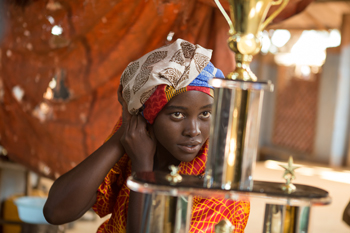 That is one of the most powerful messages in the film: that, no matter where you start from, you can still accomplish the greatest of things."
That is one of the most powerful messages in the film: that, no matter where you start from, you can still accomplish the greatest of things." David Oyelowo did not play chess before this film but he now plays it with his wife and kids. 'In the world of iPads and cellular phones it is incredibly comforting to be able to just look someone in the eye and be intellectually engaged with the board and these pieces," says David Oyelowo. 'It's a really meditative, wonderfully intellectual pursuit, and it's brought my kids and me closer."
Check Mate
'Queen of Katwe" is a vibrant, powerful human story that proves that genius is, indeed, everywhere…we just need to be acknowledge and nurture it. With Robert Katende's support and guidance and her mother's love and inspiration, Phiona Mutesi is able to pursue her dreams of becoming a chess champion under the most unlikely of circumstances and in one of the most unlikely places, eventually saving herself and her family.
The strength and humanity of the characters, who persevere against all odds, never giving in to self-pity but attempting to live their lives to the fullest, will leave audiences feeling incredibly humbled, yet empowered. It is a sentiment that director Mira Nair shares as well.
'The triumph of the human spirit is not to weep for what we don't have but to focus on what we do have and allow that to take us to a place we never imagined possible," she says.
'I have a daughter and I want her to watch this film and feel like she can do anything because she is worthy of it, because she applies herself, as we see Phiona do," says David Oyelowo. 'My hope is that some young girl in Iowa who wants to be a pilot will watch this film and be inspired to do what she wants to do."
Queen of Katwe
Release Date: September 30th, 2016
MORE




